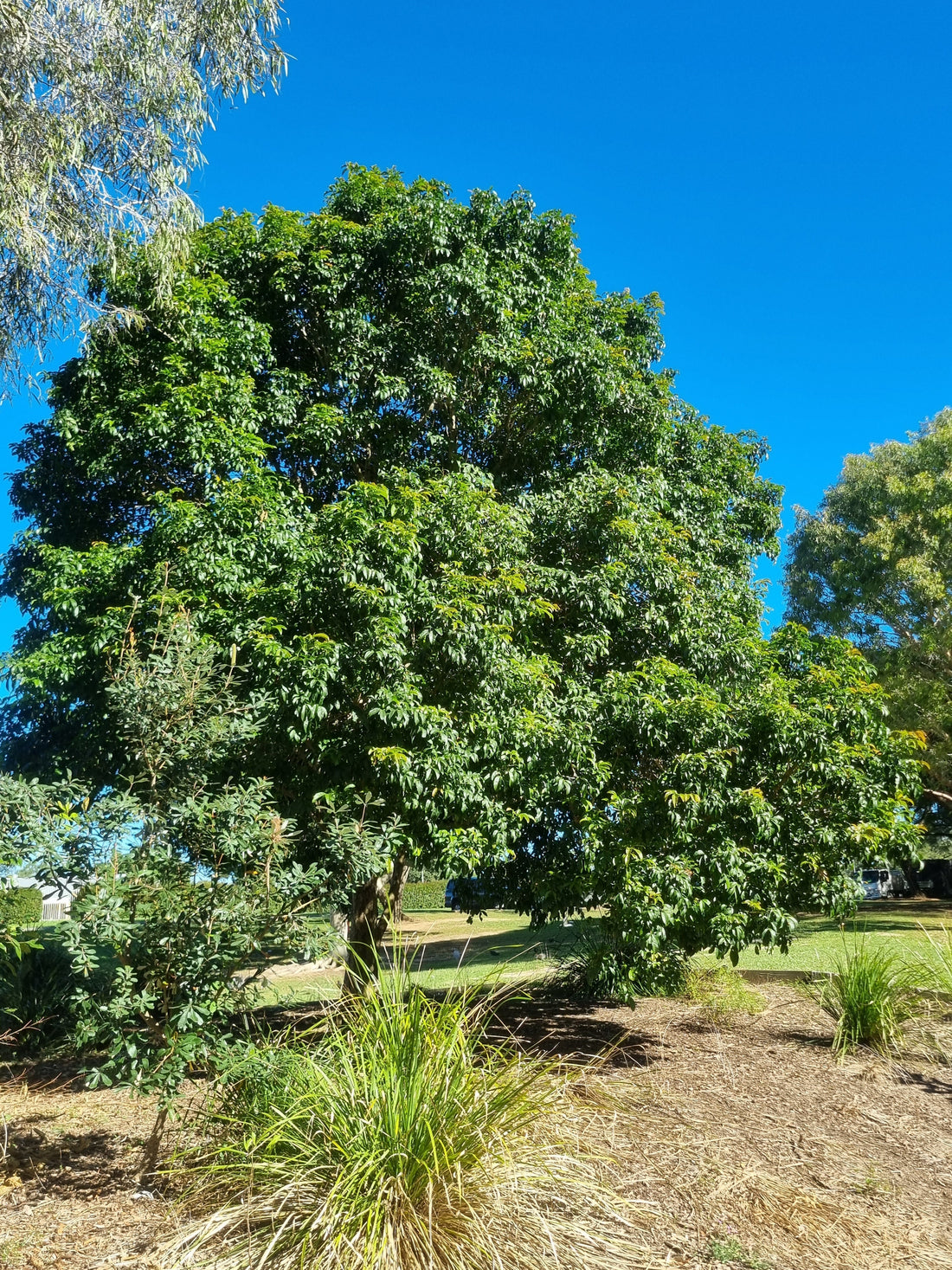
Best Native Trees for Brisbane and SEQ Backyards
Share
Planting native trees isn’t just about making your garden look great – it’s about creating a thriving, sustainable environment right outside your door. From supporting local wildlife to offering delicious bush tucker and cool, shady spots to relax, native trees are some of the best investments you can make for your backyard in Brisbane and South East Queensland (SEQ).
Why Choose Native Trees?
-
Support Local Wildlife: Native trees provide food and shelter for birds, bees, butterflies, and other beneficial critters.
-
Low Maintenance: These plants are adapted to Australian conditions, meaning they’re more drought-tolerant and pest-resistant.
-
Bush Tucker Potential: Many natives produce edible leaves, berries or seeds – great for anyone who loves unique, homegrown flavours.
-
Shade & Privacy: Trees can keep your garden cooler and give you the privacy that makes outdoor spaces feel like a retreat.
-
Seasonal Beauty: From colourful flowers to striking foliage and form, there’s always something to love year-round.
Our Top Picks for Brisbane & SEQ Backyard Natives
Lemon Myrtle (Backhousia citriodora)
A beautiful rainforest tree known for its lemon-scented leaves, which can be used fresh or dried for teas, marinades, and desserts. It produces clusters of creamy-white flowers and is loved by bees. Ideal for sunny to partly shaded positions in well-drained soil.
Native Gardenia (Randia fitzalanii)
A small, slow-growing tree with dark glossy leaves, white perfumed flowers, and rounded yellow fruit. Grows well in shaded to partly shaded areas, and is suitable for subtropical and tropical gardens.
Eumundi Quandong (Elaeocarpus eumundi)
A mid-sized, evergreen tree with glossy, dark green foliage and clusters of cream flowers, followed by deep blue fruit. This rainforest species is ideal for screening, street planting, or as a feature tree. It attracts birds and thrives in full sun to part shade.
Tulipwood (Harpullia pendula)
A small, hardy tree with dense, dark green foliage and striking orange-red seed capsules. It’s drought-tolerant, bird-attracting, and ideal for urban backyards as a feature or shade tree.
Fraser Island Apple (Acronychia imperforata)
This coastal rainforest species is perfect for screening and bush tucker gardens. It features glossy leaves, small white flowers, and edible fruit enjoyed by birds and humans alike.
Lilly Pilly 'Cascade'
A weeping form of Lilly Pilly with pink new growth and masses of pink flowers in spring and autumn. It forms a dense, attractive screen and is perfect as a feature plant or in containers. Birds love the berries, and the flowering stems are great for floral arrangements.
Tuckeroo Tree (Cupaniopsis anacardioides)
A medium-sized, fast-growing tree with rounded canopy, bright green foliage, and orange-yellow seed pods that birds adore. Excellent for coastal areas, street planting, and backyard shade.
Weeping Lilly Pilly (Waterhousea floribunda)
A fast-growing, evergreen tree with a dense, weeping canopy, perfect for hedging or screens. It has fluffy white flowers in summer and edible pink berries. It handles pruning well and is great for urban gardens.
Golden Penda (Xanthostemon chrysanthus)
Features spectacular golden-yellow flowers that attract nectar-feeding birds and bees. This tropical native tree is ideal for sunny positions and creates a striking floral display in warmer climates.
Weeping Bottlebrush (Callistemon viminalis)
A hardy small tree with weeping foliage and brilliant red bottlebrush flowers that attract birds. Thrives in a wide range of soils and is excellent for hedging or as a feature.
Grevillea 'Honey Gem' & Other Grevilleas
This cultivar is a fast-growing hybrid with large, orange-yellow flowers and fern-like foliage. It thrives in sunny, well-drained positions and brings in nectar-feeding birds. Most grevilleas are low-maintenance and drought-tolerant.
Lilly Pilly 'Resilience' & Other Varieties
A popular hedging plant with glossy green leaves and bright red new growth. It produces small white flowers and edible purple berries. Very tough and adaptable, making it perfect for privacy and low-maintenance gardens.
Illawarra Flame Tree (Brachychiton acerifolius)
Famed for its brilliant red bell-shaped flowers that cover the tree in late spring or early summer. A stunning feature tree best suited to larger yards and warm climates.
Cinnamon Myrtle (Backhousia myrtifolia)
A medium-sized rainforest tree with aromatic leaves that smell like cinnamon when crushed. Creamy white flowers bloom in clusters, and the plant thrives in moist, well-drained soil.
Hard Quandong (Elaeocarpus obovatus)
A tall rainforest tree with large, glossy leaves and blue fruit. It’s excellent for attracting birds and creating a lush, green backdrop in subtropical or tropical gardens.
Ivory Curl (Buckinghamia celsissima)
This striking tree produces long, curled creamy flower spikes and lush green foliage. It’s fast-growing, ideal for screening, and a favourite of native bees and birds.
Foxtail Palm (Wodyetia bifurcata)
A stunning palm with uniquely bushy fronds that resemble a fox’s tail. Originally from Queensland, it’s drought-tolerant and makes a tropical statement in sunny spots.
Brown Plum Pine (Podocarpus elatus)
A tall, slow-growing conifer with deep green foliage and edible purple fruit. Traditionally used by Indigenous Australians for food. Prefers fertile soil and consistent moisture.
Leptospermum 'Cardwell'
A weeping form of tea-tree with masses of white flowers in spring. Hardy and adaptable, it tolerates both wet and dry conditions and makes a lovely feature or screening plant.
Bring Your Backyard to Life
Whether you're after privacy, pollinators, or a productive garden filled with native flavours, there's a tree on this list for you. Choosing native species means less fuss, more life, and a backyard that gives back — especially in Brisbane and the surrounding SEQ region.
Ready to plant your own native haven? Browse our full range and enjoy local delivery, expert advice, and quality you can trust.
Want help picking the right tree for your space? [Contact us here] or visit us at the markets!
